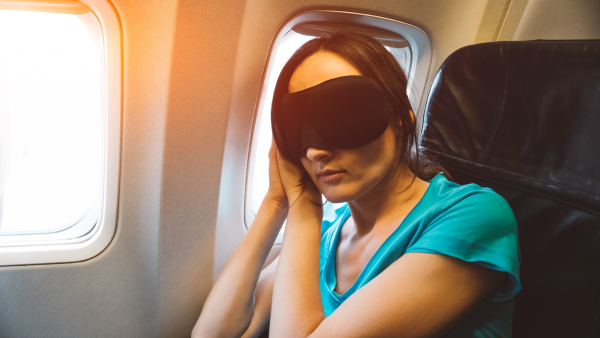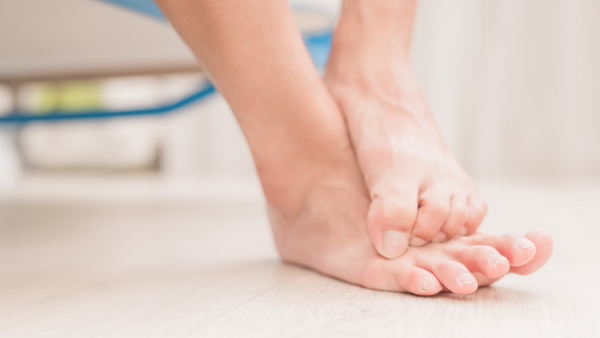Anyone who has ever taken a long flight will know this: In the first few days, you are usually plagued by sleep disorders and tiredness. These are typical symptoms of jet lag. Here you can find out what jet lag is and what you can do about it.
What is jet lag?
The term jet lag describes very well what it is about. The word comes from English. Jet means jet plane and lag means time difference.
Because we will be able to cross several time zones in just a few hours by plane, our internal clock will be disrupted. Our bodies have to get used to the new sleeping and eating times, which takes some time. [1] Jet lag is therefore a modern phenomenon that has only existed since the invention of the airplane.
Symptoms of jet lag
Jet lag is experienced very individually. Some people hardly notice it, while others suffer greatly from it. The symptoms are not the same for everyone either.
However, the following symptoms are typical and frequently observed: [2]
- Problems falling asleep and staying asleep
- fatigue
- Reduced performance
- dizziness
- Concentration problems
- Headache
- Irritability
- Digestive problems
- Loss of appetite
Why is jet lag less pronounced heading west?
Many people have fewer problems flying west than flying east: they find flying west much more pleasant. Why is that?
When you fly west, the day gets longer, so you go to bed later and can sleep longer the next day. Sounds a bit like a vacation or a weekend, doesn't it?
Exactly! That's why night owls in particular have fewer problems when they fly west. For morning people, however, who naturally wake up early in the morning and like to go to bed early, it's the exact opposite. They find flights east easier.
In the end, however, it makes no difference: Anyone who flies west will come back at some point and vice versa.

How long does jet lag last?
How long jet lag lasts varies from person to person. As a rule of thumb, jet lag lasts one day for every hour of time difference. So if there is an 8-hour time difference, you can expect it to take 8 days for your body to get used to the new time zone.
This is how you can reduce jet lag.
Unfortunately, jet lag cannot be completely avoided when there is a big time difference. But there are a few things you can do to reduce the effects and to adjust to the new time more quickly.
1) Prepare for the time difference
You can prepare for jet lag before you fly. If you're flying west, try going to bed a little later and sleeping a little longer than usual in the days before departure.
If you are flying east, the opposite is true: in this case, you should try to go to bed a little earlier and get up earlier before the flight.
2) Fly at a convenient time
This point is very important. For example, if you are flying west and in the days before the flight you have already adjusted your daily routine to the new time zone by going to bed later, you should avoid having to get up unusually early for the flight. This would ruin all your preparation. On the day of departure, you should therefore sleep in as much as possible.
Conversely, you should also arrive at your new location during the day. Otherwise, you will disrupt your sleep-wake rhythm more than necessary.
3) Adjust your meal times to the new time zone
Eating times have a big impact on the sleep-wake rhythm: we usually eat during the day and do not eat at night when we sleep. [3]
Even on the plane, you should make sure to adjust your meal times to the new time zone. If you are on the plane and it is the middle of the night in the new time zone, you should not eat anything.
After you arrive, you should eat at the usual times, but in the new time zone. For example, if you normally eat breakfast at 8 a.m., lunch at 12 p.m. and dinner around 7 p.m., you should do the same in the new time zone. This will help your body adjust more quickly.
4) Use natural daylight
Natural daylight determines our day-wake rhythm. It can therefore help you enormously to get used to the new time zone as quickly as possible. [4]
Early morning daylight helps you wake up. Waking up to daylight is ideal. You should also get natural daylight soon after you wake up. The commute to work is a good time to do this. If you don't have to leave the house, you can take a short walk around the block. This strategy is very useful whether you're flying east or west. Morning daylight signals to your body that it's time to start the day. Conversely, going to bed at a reasonable hour will also help you.
Conversely, this also means that you should avoid artificial light in the evening as much as possible. If you are flying west, staying awake longer may help you. But be aware that too much light in the evening has a negative impact on the quality of your sleep. You should be especially careful with light in the evening if you have problems falling asleep. If you cannot avoid being exposed to artificial light in the evening, blue light filter glasses can help.
5) Use coffee wisely

On the one hand, coffee can help you reduce jet lag, but on the other hand, you have to be careful with coffee. Otherwise, it can have the opposite effect. Coffee can wake you up and thus alleviate the symptoms of jet lag, but on the other hand, it can also have a negative effect on sleep. You should of course avoid the latter at all costs.
If you're flying west and have trouble staying awake late in the evening, an afternoon coffee can help. In the morning, however, coffee can help you get going, especially if coffee is part of your morning routine anyway.
However, if you are flying east, you should be careful about drinking coffee in the afternoon, as it may prevent you from falling asleep at bedtime.
6) Reduce jet lag with melatonin
Melatonin is a sleep hormone that determines our sleep-wake rhythm.
Light inhibits melatonin synthesis. When it gets dark in the evening, the body normally produces melatonin. However, if you have jet lag, it can take several days for melatonin synthesis to adjust.
However, you can also take melatonin from outside. This is very useful for jet lag. It can shorten the time it takes to fall asleep and reduce the feeling of jet lag.
Melatonin is particularly helpful on flights heading east. If you have trouble falling asleep, it can help you go to bed at a reasonable time. You should take melatonin in the evening, about half an hour before your planned bedtime. Studies have shown that taking melatonin can reduce jet lag. [5]
Here you can learn more about melatonin and how it can help you.
[1] https://www.ncbi.nlm.nih.gov/pmc/articles/PMC3630947/
[2] https://www.nhs.uk/conditions/jet-lag/
[3] https://www.ncbi.nlm.nih.gov/pmc/articles/PMC3227713/

















